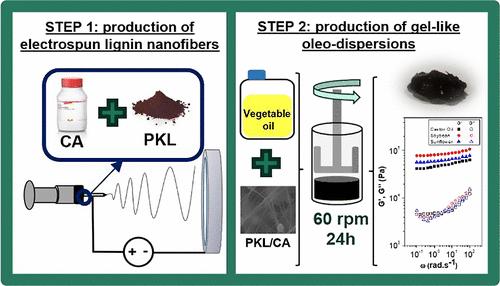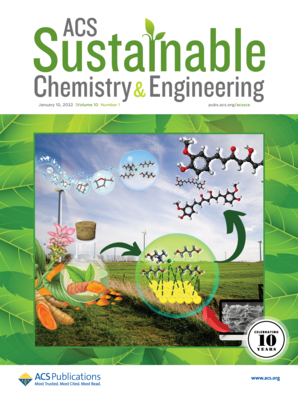Valorization of Kraft Lignins from Different Poplar Genotypes as Vegetable Oil Structuring Agents via Electrospinning for Biolubricant Applications
IF 7.3
1区 化学
Q1 CHEMISTRY, MULTIDISCIPLINARY
引用次数: 0
Abstract
This work explores the use of Kraft lignins sourced from different poplar genotypes (Populus alba L. “PO-10-10-20” and Populus × canadensis “Ballotino”) isolated by selective acid precipitation (at pHs 5 and 2.5) to produce electrospun nanostructures that can be further employed for structuring vegetable oils. This approach offers a new avenue for converting these waste materials into high-value-added ingredients of eco-friendly structured lubricants. Electrospinning of poplar Kraft lignin (PKL)/cellulose acetate (CA) solutions yielded homogeneous beaded nanofiber mats that were able to generate stable dispersions when they were blended with different vegetable oils (castor, soybean, and high-oleic sunflower oils). Electrospun PKL/CA nanofiber mats with larger average fiber diameters were achieved using the lignins isolated at pH 5. Dispersions of PKL/CA nanofibers in vegetable oils presented gel-like viscoelastic characteristics and shear-thinning flow behavior, which slightly differ depending on the nanofiber morphological properties and can be tuned by selecting the poplar lignin genotype and precipitation pH. The rheological properties and tribological performance of PKL/CA nanofibers suitably dispersed in vegetable oils were found to be comparable to those obtained for conventional lubricating greases. Additionally, lignin nanofibers confer suitable oxidative stability to the ultimate formulations to different extents depending on the vegetable oil used.

通过电纺丝将不同杨树基因型的牛皮纸木质素作为植物油结构助剂进行生物润滑剂应用的价值评估
这项研究探索了如何利用通过选择性酸沉淀(pH 值为 5 和 2.5)分离出来的来自不同杨树基因型(白杨 "PO-10-10-20" 和杨树 × canadensis "Ballotino")的牛皮纸木质素来生产电纺纳米结构,这些结构可进一步用于植物油的结构化。这种方法为将这些废料转化为生态友好型结构润滑油的高附加值成分提供了一条新途径。杨木牛皮纸木质素(PKL)/醋酸纤维素(CA)溶液的电纺丝产生了均匀的珠状纳米纤维毡,当它们与不同的植物油(蓖麻油、大豆油和高油酸葵花籽油)混合时,能够产生稳定的分散体。PKL/CA纳米纤维在植物油中的分散体呈现出凝胶状粘弹特性和剪切稀化流动行为,这些特性因纳米纤维形态特性的不同而略有差异,可通过选择杨木素基因型和沉淀pH值进行调整。研究发现,适当分散在植物油中的 PKL/CA 纳米纤维的流变特性和摩擦学性能与传统润滑脂的流变特性和摩擦学性能相当。此外,木质素纳米纤维在不同程度上赋予了最终配方适当的氧化稳定性,具体取决于所使用的植物油。
本文章由计算机程序翻译,如有差异,请以英文原文为准。
求助全文
约1分钟内获得全文
求助全文
来源期刊

ACS Sustainable Chemistry & Engineering
CHEMISTRY, MULTIDISCIPLINARY-ENGINEERING, CHEMICAL
CiteScore
13.80
自引率
4.80%
发文量
1470
审稿时长
1.7 months
期刊介绍:
ACS Sustainable Chemistry & Engineering is a prestigious weekly peer-reviewed scientific journal published by the American Chemical Society. Dedicated to advancing the principles of green chemistry and green engineering, it covers a wide array of research topics including green chemistry, green engineering, biomass, alternative energy, and life cycle assessment.
The journal welcomes submissions in various formats, including Letters, Articles, Features, and Perspectives (Reviews), that address the challenges of sustainability in the chemical enterprise and contribute to the advancement of sustainable practices. Join us in shaping the future of sustainable chemistry and engineering.
 求助内容:
求助内容: 应助结果提醒方式:
应助结果提醒方式:


